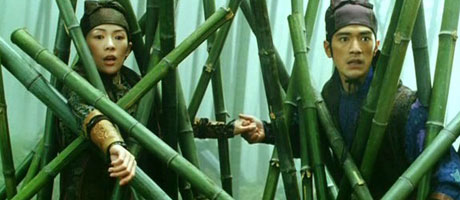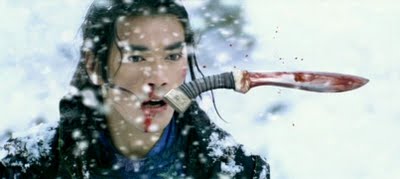



Haunting the Web Since 1999
“‘We’re like a stock exchange. You can buy and sell with us,’ says Alan Qiu, a founder of the Shanghai-based Ucdao.com. ‘We farm out the different jobs. Some people say, “I want to get from Level 1 to 60,” so we find someone to do that.'” Via a friend in the program, the NYT examines Chinese online gaming factories. “Most of the players here actually make less than a quarter an hour, but they often get room, board and free computer game play in these ‘virtual sweatshops.’“
“I was trying to escape. Obviously, it didn’t work.” If it’s any consolation, Dubya, we all feel just as trapped. In one of those resounding visual metaphors that capture a presidency and that life occasionally kicks up for all to see (the last one being Dubya’s fiddling during Katrina), our leader gets stymied by a locked door while trying to evade a reporter’s questions about his China trip (which were pretty softball, given all the things he could’ve been asking these days.)
In somewhat related news, in the relatively sanguine Post story about the door incident, the following depressing information is included: “In five years in the presidency, Bush has proved a decidedly unadventurous traveler…As he barnstormed through Japan, South Korea and China, with a final stop in Mongolia still to come, Bush visited no museums, tried no restaurants, bought no souvenirs and made no effort to meet ordinary local people…[Laura Bush] once persuaded him to go to the Hermitage Museum in St. Petersburg, only to see him burn through the place in 30 minutes. He dispensed with the Kremlin cathedrals in Moscow in seven minutes. He flatly declined an Australian invitation to attend the Rugby World Cup while down under.”
“Fighting over the ‘evolving standards of decency’ underlying the Eighth Amendment’s ban on ‘cruel and unusual punishment,’ the 5-to-4 opinions reflect an all-out war between the proponents of a living (or at least medium-rare) Constitution and those who want to see it dead (or perhaps well-done, with a nice pinot).” Slate‘s inimitable Dahlia Lithwick explains the Kennedy-Scalia sniping undergirding the Supreme Court’s very welcome 5-4 decision to ban juvenile executions. To keep things in perspective, the only other nations besides us that have put juveniles to death since 2000 are China, Iran, Pakistan, and the Congo…not exactly what you’d call the Axis of Freedom.

It’s clear early on in House of Flying Daggers that Zhang isn’t shooting for anything with the ambition and gravitas of Hero…Instead, we’ve got a plot strung together with a number of genre cliches, most notably the “deep” undercover cop (Takeshi Kaneshiro) questioning his motivation and the sixth-sense-laden blind girl (Zhang Zi Yi, lovely as always) who improbably kicks more ass than Rutger Hauer in Blind Fury. Hey, genre exercises are cool…let’s get to the fighting. Alas, there seemed to be a lot of filler between the action setpieces, and I found myself hoping through several unmemorable meet-cute scenes that more low-level flunky guards would show up and be efficiently dispatched.
With that in mind, I know it’s a little late to be complaining about the realism of kung-fu sequences. But the fights in House of Flying Daggers are so stylized and farfetched that I didn’t find them all that engaging — there was no real sense of danger to be had. In Crouching Tiger, Hero and countless lesser kung-fu films, I never found myself thinking so much about the logistics of what’s going on, but Daggers seems to beg questions like, “Where are these tree-flying policemen obtaining their inexhaustible supply of bamboo spears?” and “How straight and true could you throw a dagger if gravity was of absolutely no consequence?” Perhaps it’s unfair to call out this House for its fantastical fight sequences, but for one reason or another my disbelief was suspended less than usual.
At any rate, not to give the whole game away, but the movie does eventually contain some unexpected twists in the middle going. That being said, the denouement of the film also suffers from one of the most egregious dead-“not dead” reverses I’ve seen in recent memory. If martial arts films are your bag, then you’ll probably find House of Flying Daggers an operatic tale of love, passion, and betrayal. But, as for me, I kinda wish these two young lovers had spent less time being smitten and more time smoting.

If Hero didn’t satisfy your quota for arthouse kung-fu in 2004, the teaser for Zhang Yimou’s House of Flying Daggers is now up, and it looks to be more of the same aesthetic…hopefully, with less jingoism this time around.
Some food for thought for my Asia-Pacific sections today (by way of Prof. Armstrong): Historian John Dower compares the Iraq imbroglio to Japanese expansion in Manchuria. Before rejecting his argument outright, at least consider the source. Dower knows a great deal about America’s experiences in postwar Japan — more, I’d wager, than anybody working in the Dubya administration.

For much of its running time, Hero is a strikingly kinetic and poetic piece of work that lulls you in with its languid rhythm and sensual colors. As you may or may not know from the ads, a nameless warrior (Jet Li) comes before the rightly paranoid Emperor Qin (a very good Chen Daoming) to tell him of how he managed to eliminate the province’s three most dangerous assassins (an all-star line-up of Donnie Yen, Maggie Cheung, and Tony Leung, with the lovely Zhang Ziyi thrown in to boot.) But, faster than you can say Swift Boat, the Emperor tells Nameless he’s full of it, and offers his own explanation for recent acts of heroism, which are further revised as the film goes forth.
As I said, these various retellings move slowly — even despite the fighting — but with purpose, and are made distinct from one another through color shifts that are at once exquisite and bewitching. But, eventually we come to the end of the story, and therein the problem lies. For, as it turns out, the moral that undergirds our recent contemplations is a pretty reprehensible one (and one you’d think might have been re-evaluated in light of the last century): Namely, that brutal, despicable tyrants must be allowed their cruelties and massacres for the sake of the State.
When this Machiavellian might-makes-right proposition was first uttered by the characters, I thought perhaps I was misreading what was going on. But, no, they go through with it, and almost all of the major characters we’ve been following take a dive in varying fits of nationalistic self-sacrifice, so that the Emperor Qin can gloriously maim, loot, and murder his way into uniting the Middle Kingdom. And, thus the film concludes with the glaring contradiction (pointed out by my friend Jeremy) of mooning over lovers to-be-reunited in “a place without borders” while extolling The Great Wall, still probably the most impressive border every built by humankind.
In sum, Hero is a sumptuous visual feast that’s operating several levels above most schlocky American action pics (including the recent Kill Bills of its US “presenter.”) But the underlying moral sensibility of the final moments is so repellent that it seriously detracts from the film. Call me an incurable Western individualist, but if excusing the crimes of one’s leader for the sake of the (Mother, Father, etc.)Land is heroism, then I’m with Tina Turner. Take it elsewhere, Raggedy Man.

As space cadets around the nation hoped, it now looks like China’s recent foray into the stars will draw dividends stateside…Apparently, Bush is about to announce a US return to the moon. “‘You’ve got the Chinese saying they’re interested — we don’t want them to beat us to the Moon. We want to be there to develop the sweet spots,’ Republican Senator Sam Brownback says.” Now here’s a Dubya campaign initiative I can get behind.
As Yang Liwei recuperates from his historic mission, China readies for the moon.